Your cart is currently empty!
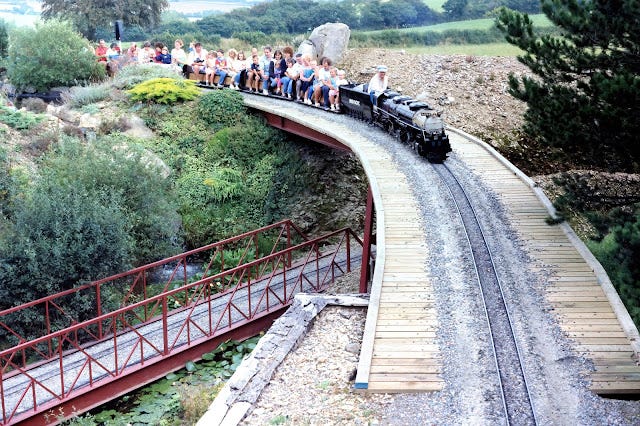
Dobwalls Adventure Park, Cornwall
Timeline
1956 — John Southern acquires the 22-acre Penmount Farm which at the time is home to Dobwalls football club. Over the following years he transforms it into the largest pig farm in Cornwall.
1966 — Southern acquires a 5” gauge model of a GWR King and builds a railway around the 4 acre field next to the farm buildings.
1967 — The King is replaced by a larger 7 ¼” LMS Duchess which had been built back in the 1930s by Harry Powell. A new railway is planned but Southern wanted something more exciting than the traditional “loop around the field” so he designs a much more elaborate loop with sharp curves, steep gradients (1 in 25) and curved tunnels. Over 3,000 little pine trees are planted. Construction on the half-mile layout continues over the next 2 years
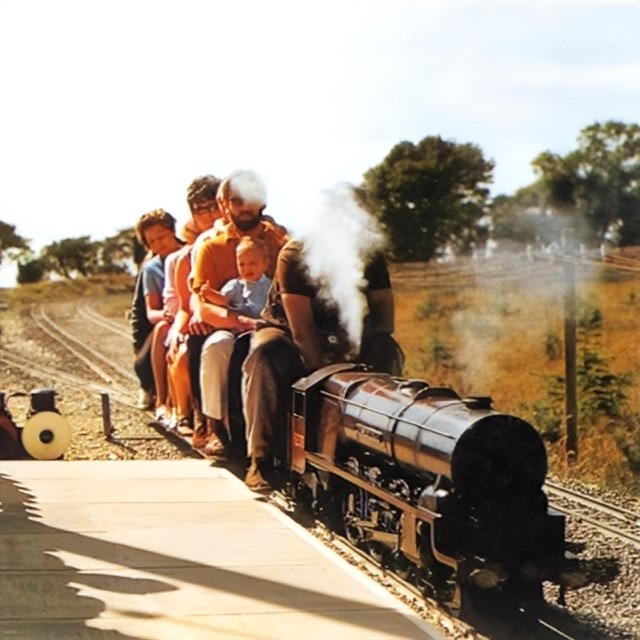
1969 — The railway acquires a couple of petrol locos from David Curwen. One is based on a scale Western diesel and the other on a US-style switcher which was changed from a BR Class 20 halfway through construction.

1970 — The railway is still a private hobby but increasing numbers of people begin showing up and peering through the hedges so the decision is made to open it to the public. Even though the trees are still small they were thinking ahead and named it The Forest Railway. Over 20,000 people enjoy a ride that first first summer.
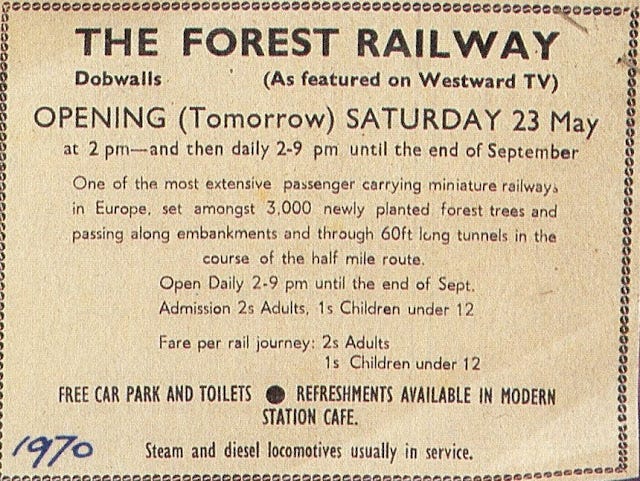


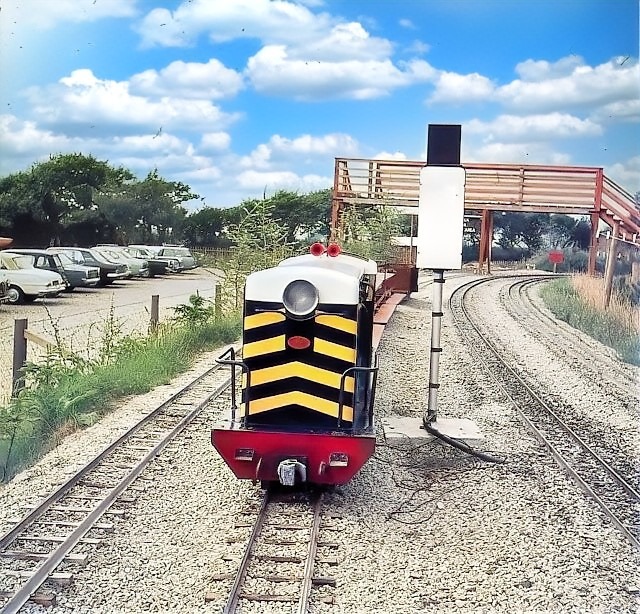

1972 — Southern opens an art gallery in an old cow shed to show off his collection of Archibald Thorburn wildlife paintings. He bought his first one aged just 11 for a pound!
1973 — The track is extended by adding another loop around the outside of the original loop. New signaling is installed allowing 3 trains to be used at once. That same year two more steam locos arrive from David Curwen, a Colonial-style 0–6–0 named after its builder and another K36 named ‘Queen of Colorado’ which was is loan from Brian Hollingsworth. The Western diesel is sold.
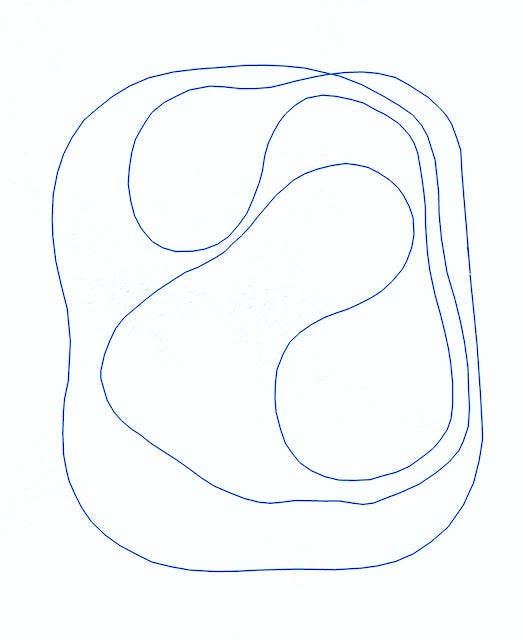


1974 — ‘Queen of Wyoming’ arrives from Severn Lamb




1979 — The Union Pacific project cost £120,000 and officially opens to the public in April when the ‘Big Boy’ hauls a special train of 88 people. That year was a great success with a 20% increase in passengers bringing the yearly total to 170,000. The following month a new diesel named ‘Centennial’ arrives from Severn Lamb — it’s 17ft long and weighs 1.5 tons. The railway now has the largest and most powerful 7 ¼” steam AND diesel locos in the world, and is widely considered to be the best miniature railway in the UK.
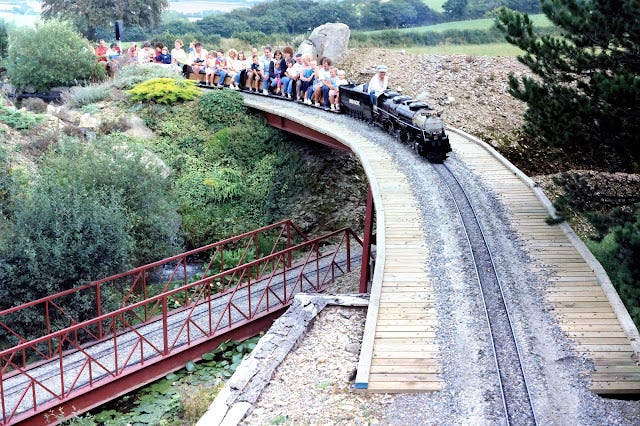
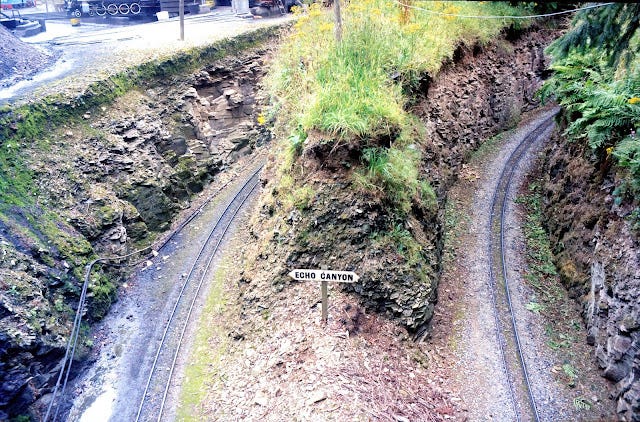
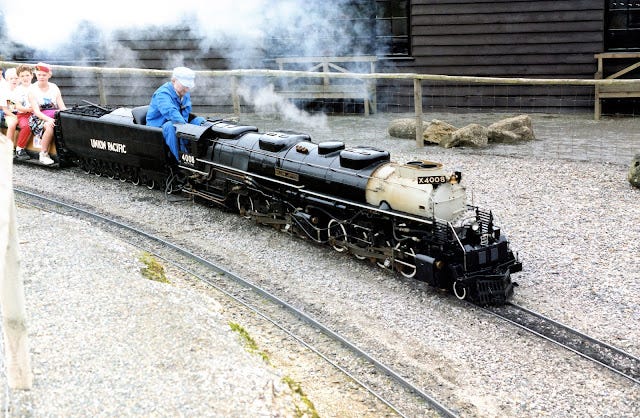
1980 — In July ‘Otto Mears’ arrives from David Curwen and despite looking similar to ‘General Palmer’ is actually based on the slightly larger K37 design. Also that same month ‘Mathias Baldwin’ arrives from Severn Lamb
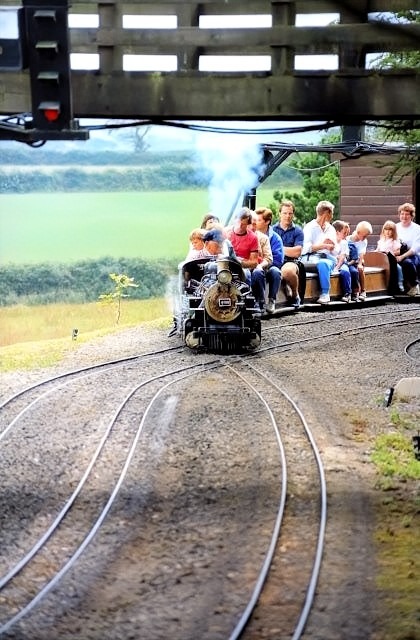
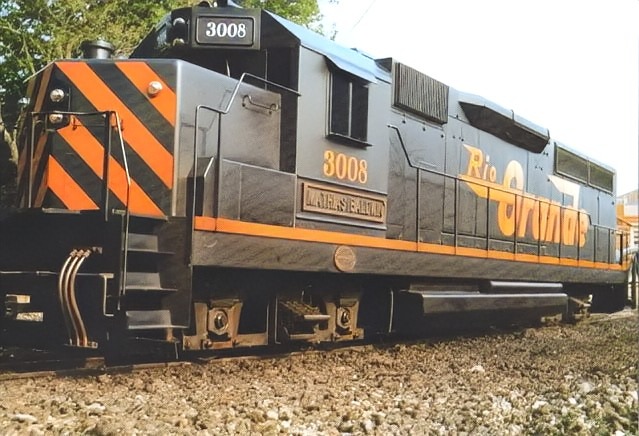
1981 — Other attractions are added including an outdoor LGB G-scale layout, radio control boats and a model railway exhibition built above the carriage shed (this was later removed to make way for a more lucrative antique penny arcade and sweet shop). ‘Queen of Nebraska’ arrives from Severn Lamb in September.

1983 — ‘Spirit of America’ arrives from Severn Lamb in August
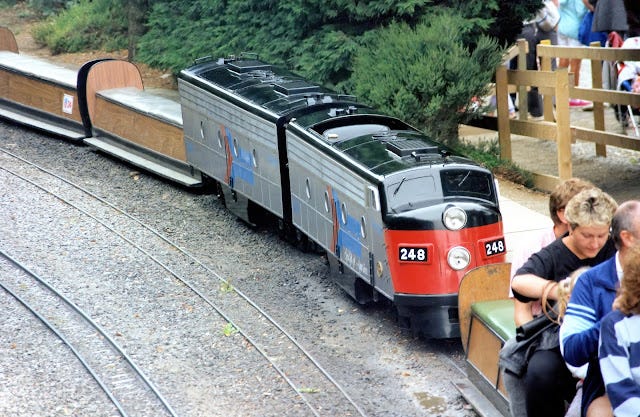


1986 — The art gallery is extensively rebuilt as Mr Thorburn’s Edwardian Countryside, an innovative interactive exhibition featuring an interior street scene and period tea room. The project costs £300,000 and involves the construction of a new building. It was officially opened by Prince Charles and later receives Sotheby’s award for Britain’s Best Fine Art Museum.


A lot of these developments are financed through bank borrowing and the railway even appears in TV adverts for Mercantile Credit.
1988 — Another £300,000 is spent on a huge outdoor adventure playground which becomes the largest of its type in the UK.

Other attractions are added including remote control trucks, a shooting gallery and gold panning. The park begins advertising itself as an adventure park and becomes one of the top attractions in Cornwall with over 300,000 annual visitors and the locos clocking up over 20,000 miles every year
1989 — ‘Pioneer’ arrives from Severn Lamb in August. The old US-switcher is sold.
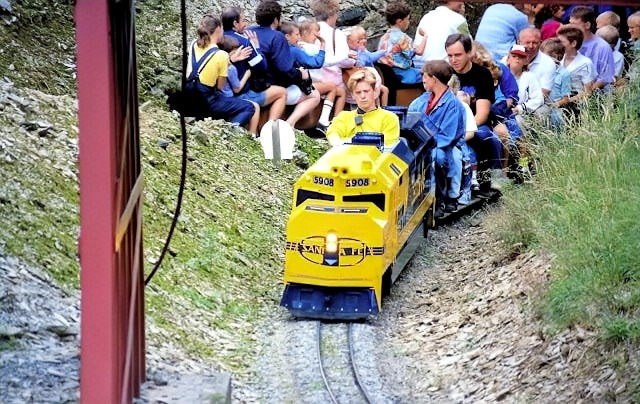
By the early 1990s the financial situation was becoming quite desperate with the park stating it was paying £100,000 a year in bank interest alone. To try and reduce the debt some of the locos were advertised for sale in the World’s Fair but no buyers are found.


1992 — The old Cromar White aluminium track is replaced by steel.
1993 — In March John Southern makes the reluctant decision to sell 140 of his prized Thorburn paintings at a huge auction at Sotheby’s in London. The sale generates over a million pounds and presumably allows the railway to clear its debts. The Thorburn museum continues in operation with prints instead of originals. That same year a fire destroys the carriage shed and upstairs arcade. A new single-story replacement is soon built.
1995 — A large 10,000 sq ft indoor play building is opened. The Thorburn Museum is renamed the John Southern Gallery and specialises in original wildlife art and limited edition prints.
1996 — Mr Blobby arrives at Dobwalls! The indoor play area is rethemed to Krazee Kavern and a stage is built outside for shows and meet-and-greets. Noel Edmonds makes an appearance. A Go Kart track is built


During the late 1990s the Cornish holiday pattern is changing with more people jetting off abroad and more couples opting for long weekends and short breaks instead of traditional 2 week family holidays. New rules punishing parents for taking kids out of school don’t help the situation. Turnover at the park drops 30% between 1997 and 2000.
2001 — The nearby Eden Project opens and attracts 2 million people in its first season which draws even more visitors away. ‘General Palmer’ carries its one millionth passenger since arriving 30 years earlier.
2003 — A second indoor play area is opened aimed at younger children. Even though the two railways are still carrying 100,000 visitors a year it represents a 70% drop from just 15 years earlier — the park is now running at a loss.
2005 — The park is sold to Malcolm Southern, the eldest son, and a new £7 million redevelopment plan is announced. The top third of the site, formerly home to the farm and now the Union Pacific railway, is be redeveloped into holiday homes. The middle section is to remain much the same with the Rio Grande railway and play areas, whilst the lower third (currently the overflow car park) will become an eco-friendly art centre, conference facility and restaurant serving local produce. The ‘David Curwen’ steam loco is sold.
2006 – The very last train runs on 29th October 2006. The park closes down.
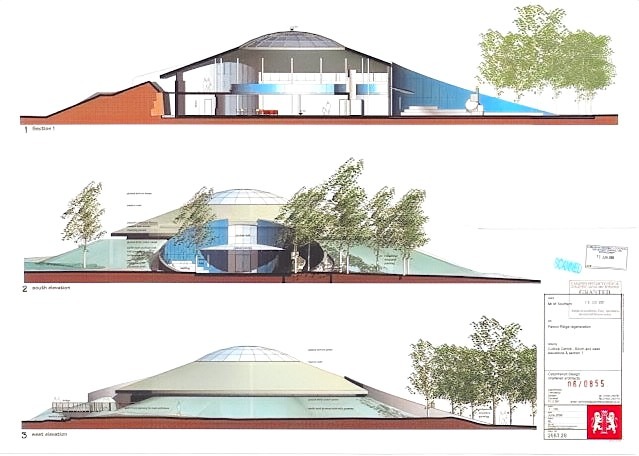
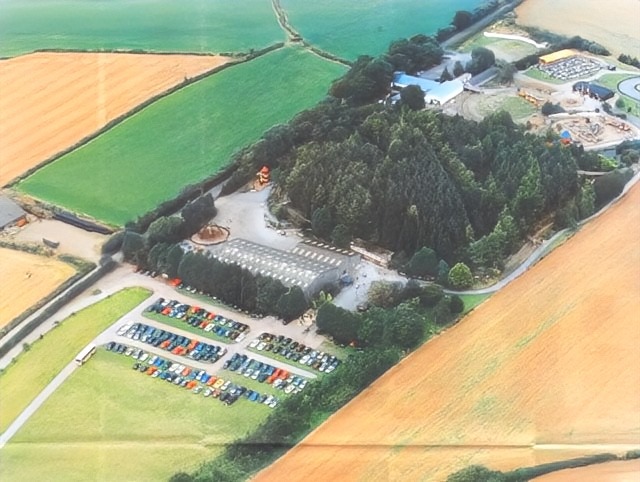





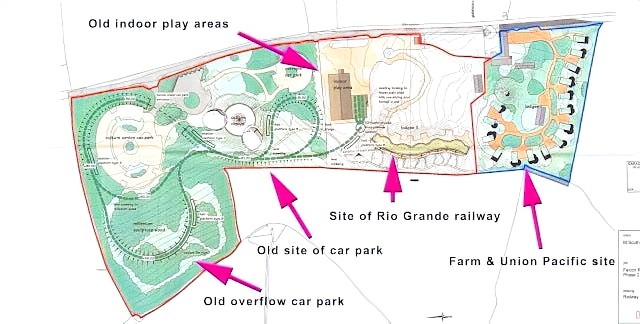
2007 — The park announces in June that the Rio Grande railway will not reopen. Most of the trees are cut down and the loco shed is demolished. Revised plans show a new railway being constructed around the art centre with one of the indoor play buildings being converted into a loco shed. The John Southern Gallery remains in business. The large indoor play building becomes a gymnastic centre.


In November a sealed-bid auction takes place to sell off most of the locos (4 steam, 4 diesels) plus 28 passenger carriages. The auction ends without any sale taking place. ‘General Palmer’ is not included and is being kept for future use. A new boiler is constructed.
2008 — Plowmans Garden Centre acquires the 8 locos and in April they depart for their new home in Dorset. A railway is hastily constructed and it opens in November with ‘Big Boy’ hauling the first official train.
2009 — Unfortunately the redevelopment at Dobwalls is not successful. Only two holiday lodges are ever built and nothing becomes of the new art center or the new railway. ‘General Palmer’ is sold to a buyer in Australia. Four of the old locos appear at the Great Dorset Steam Fair running on portable track.
2010 — the park reopens as a camping and caravan site. The two indoor play buildings are offered for rent as warehouse space (£33,000 a year). The Rio Grande tunnels and cuttings are filled in and the remaining play equipment sold off. The railway at Plowmans is closed due to planning issues and all of the Dobwalls locos are sold to a buyer in Australia. They leave the UK in September.
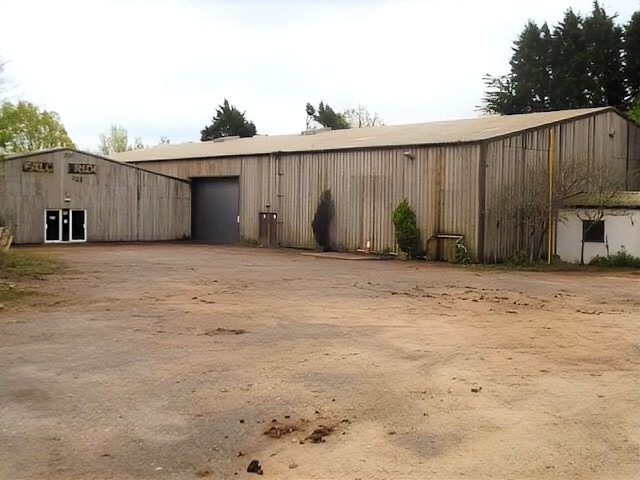


2011 — the park continues to operate as a camping and caravan site. A Thorburn painting sold in the 1993 Dobwalls auction achieves a new world record by selling at Bonham’s for £225,000.
2012 — The park sadly goes into administration and is put up for sale in June with a guide price of £400,000.
2013 — The park is sold to Charteroak in March of that year
Today the site is home to over 50 holiday lodges. Sherman Hill is still there, as is the original Penmount farmhouse and the buildings that once housed the Thorburn Gallery and carriage shed. But that’s about it. No other trace of the park remains. The site is today known as Southern Halt in tribute to its former owners.
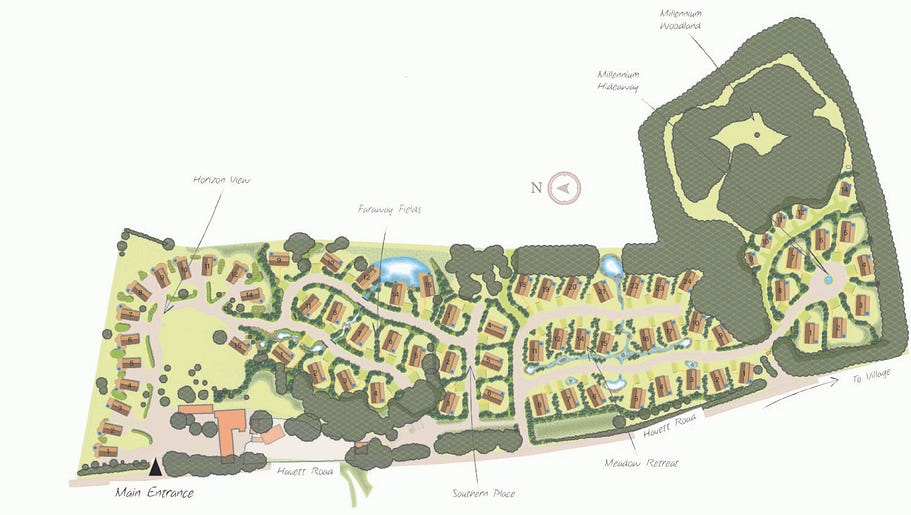

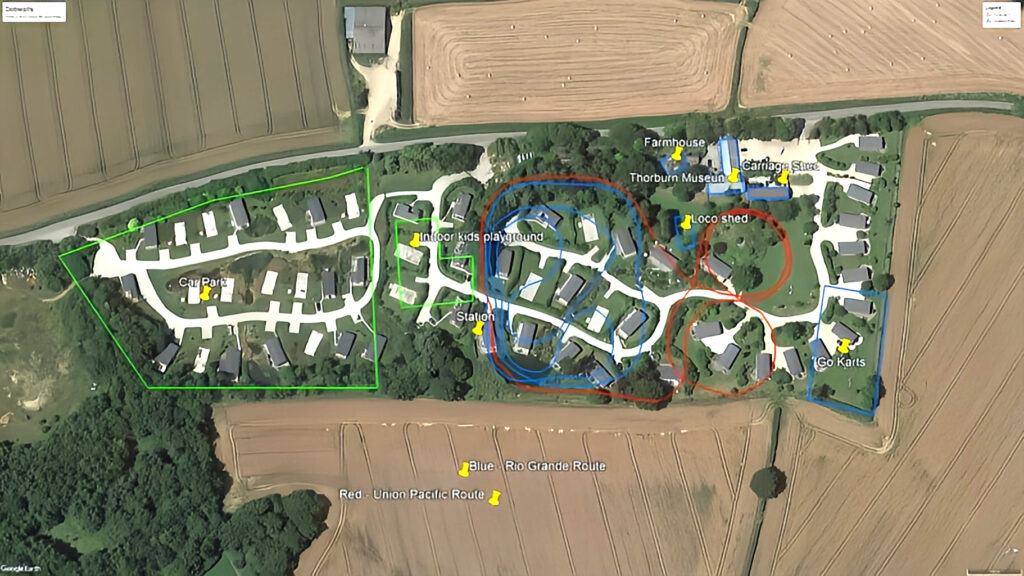

Leave a Reply